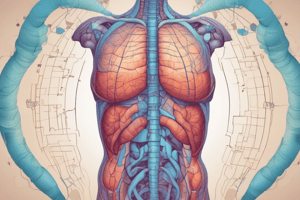Podcast
Questions and Answers
What should a study describe in enough detail to allow the experiment to be replicated?
What should a study describe in enough detail to allow the experiment to be replicated?
- The investigators involved in the study
- The equipment used in the study
- The intervention being studied (correct)
- The outcome of interest
Why is it important to standardize postoperative care in a surgical study?
Why is it important to standardize postoperative care in a surgical study?
- To decrease the risk of investigator bias
- To ensure consistency in the surgical procedure (correct)
- To increase the risk of investigator bias
- To ensure that the results are generalizable to different populations
What can occur when an investigator expects a different result in the intervention group?
What can occur when an investigator expects a different result in the intervention group?
- Selection bias
- Investigator bias (correct)
- Confounding bias
- Measurement error
Why should a study clearly define the primary and secondary outcomes of interest?
Why should a study clearly define the primary and secondary outcomes of interest?
What can measurement error lead to?
What can measurement error lead to?
Why should a study standardize the measurement of the outcome of interest?
Why should a study standardize the measurement of the outcome of interest?
What should a study try to mask to decrease the risk of investigator bias?
What should a study try to mask to decrease the risk of investigator bias?
Why is it important for a study to clearly state the expected change for the outcomes of interest?
Why is it important for a study to clearly state the expected change for the outcomes of interest?
What should a study describe for the primary outcome of interest?
What should a study describe for the primary outcome of interest?
Why is it important for a study to have a training session before the start of the study?
Why is it important for a study to have a training session before the start of the study?
Study Notes
Endocrinology
- Thyroid function tests: physiological aspects, hyperthyroidism, hypothyroidism, thyroiditis, and thyroid tumors
- Disorders of the hypothalamic-pituitary axis: pituitary adenomas, pituitary apoplexy, and multiple endocrine neoplasia syndromes
Hypertension
- Highlights of hypertension: classification, diagnosis, etiology, pathogenesis, evaluation, treatment, and special considerations
- Classification of blood pressure: diagnosis of hypertension
- Etiology and pathogenesis of hypertension: lifestyle modifications, pharmacologic treatment, and future treatments
- Evaluation of patients with hypertension: treatment options and considerations
- Special considerations: ischemic heart disease, heart failure, diabetes mellitus, chronic renal disease, cerebrovascular disease, obesity, and metabolic syndrome
Faculty and Staff
- American Academy of Ophthalmology staff: Dale E. Fajardo, EdD, MBA, Beth Wilson, Denise Evenson, Ann McGuire, Stephanie Tanaka, Susan Malloy, Jasmine Chen, Lana Ip, Beth Collins, Eric Gerdes, Lynda Hanwella, and Debra Marchi
Research and Study Design
- Importance of research in improving clinical practice: using research to improve patient outcomes
- Key aspects of study design: intervention description, perioperative management, and outcome measurement
- Intervention description: sufficient detail to allow replication of the experiment
- Perioperative management: standardization of procedures to minimize differences and bias
- Outcome measurement: clear definition, reliability, and variability consideration
Infections and Immune-Related Disorders
- Rheumatic disorders: rheumatoid arthritis, spondyloarthritis, juvenile idiopathic arthritis, systemic lupus erythematosus, and sarcoidosis
- Infectious diseases: cytomegalovirus, Epstein-Barr virus, influenza, hepatitis, human papillomavirus, Ebola virus, Zika virus, and human immunodeficiency virus
- Update on antibiotics: antibacterial agents, antifungal agents, antiviral agents, and future directions
Studying That Suits You
Use AI to generate personalized quizzes and flashcards to suit your learning preferences.
Related Documents
Description
This quiz covers tests of thyroid function, thyroid disorders, and disorders of the hypothalamic-pituitary axis. Topics include hyperthyroidism, hypothyroidism, thyroiditis, thyroid tumors, and pituitary adenomas.




